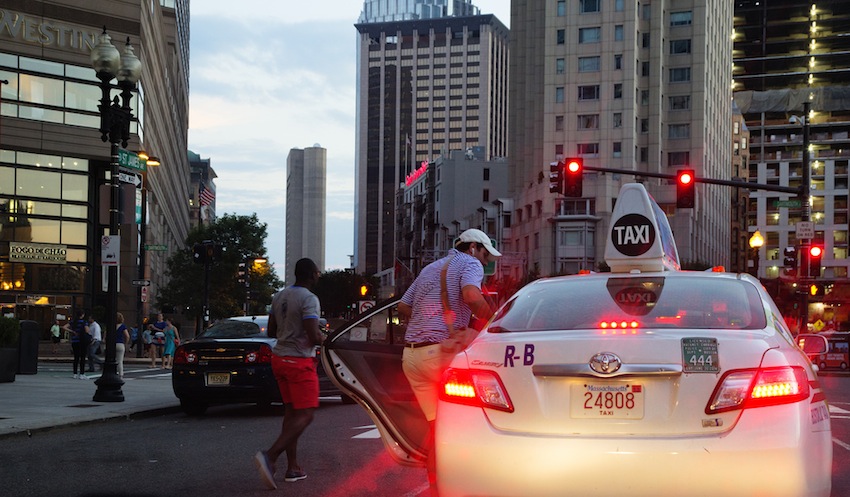Uber Is OK With the MBTA’s New Late-Night Train Service, But Cab Drivers Are ‘Concerned’

Boston Taxi Photo Uploaded by qi.Thomas on Flickr
Students and workers in Boston’s tech sector are rejoicing over the news that the MBTA will run a one-year pilot project on the weekends, where trains will operate until 3 a.m., an hour after the bars close. But some cab drivers are nervous about the impact the proposal could have on the late-night transportation industry.
Already battling new transportation services like Uber, Lyft, and Hailo—all app-based platforms that allow passengers to hail a ride at the touch of a button—Donna Shaw, manager of the Boston Taxi Association, which represents more than 1,400 cab drivers in the city, said the addition of late-night MBTA service could add another roadblock to their operations.
“It will have an impact. To what degree, I’m not sure yet,” but it will take away at least a portion of their business, she said.
The MBTA’s pilot program, which will begin in spring 2014, will allow for 15 of the most popular bus routes to run until 3 a.m. It will also leave the Red, Green, Orange, Blue, and Silver lines open until the same time, giving late-night bar-crawlers a choice between a cab ride, a smartphone-savvy pick-up service, or the train—an option that didn’t exist before.
Shaw said she is specifically concerned about use of the Red and Silver lines because a lot of the business for cab drivers comes when those services aren’t available. For the Red Line, taxi operators pick up more cash because they supplement the T’s service after hours, traveling between Somerville, Cambridge, and Boston. “It would have more of an effect, since many people will be traveling between two cities,” she said. “It would be significantly more of an impact on fares.”
The same goes for people heading to the Innovation District, or flying into Logan late at night, when travelers can’t rely on the Silver Line. “The Silver Line goes through the Innovation and Seaport area. It’s a high-density area for restaurants, businesses, and the Convention Center, and it could possibly have an impact because we have a lot of drivers covering that area,” said Shaw.
She said she isn’t worried about losing Green Line customers because many of them are students traveling back from the bars, and the fares aren’t that significant. “If you were to ask our drivers if they mind they would probably say no, because many times [the students] are kind of rowdy,” she said.
Although some cab drivers are worried about the change in nighttime service, Uber and Hailo seem to be embracing the change.
“In general, Uber is pro-option. We believe very strongly that the more options that exist in a city for transportation, the better, for both consumers and the city at large,” said Meghan Verena Joyce, general manager of Uber Boston. “It’s not something that gives us any pause. We think it’s a positive thing for both parties.”
Joyce said there is “more than enough demand” during the daytime hours and weekends that customers will continue to turn to the service. Due to Uber’s strict company policy, Joyce would not share how many trips contracted drivers make when the bars close on the weekends.
Amanda Grinavich, who works in Boston, said even though the T will be running, she will still likely rely on Uber to get home after-hours. “I think it’s great the T plans to run until 3 a.m.— and long overdue. It provides a solid option outside of an expensive cab ride home. But being realistic with myself, there’s a 99 percent chance I’ll continue to use Lyft and Uber after midnight for a few reasons,” she said. “Where I live in Brighton is about a 15-minute walk from the T and a 10-minute walk from the bus. That’s not very far, but it’s not something I’d want to be doing alone at 3 a.m. I also blame the grandma in me for wanting to get home and hop into bed versus having a 30-minute T or bus ride home. I think the luxury and ease of having services like Uber and Lyft will probably still end up being a preference for people.”
Much like Uber, the folks over at Hailo, Uber’s direct competitor, have also been welcoming the addition to the T’s operations. Earlier this year they identified the hours when bars let out as some of their busiest when the train isn’t available, but the company isn’t batting an eyelash. “We found that requests for taxis in Boston spike between 1 a.m. and 2 a.m. on weekends, after the T has closed but the bars are still open,” the company said in a blog post. “Our ultimate goal with such data initiatives is to help spur a conversation about how we can all work together to make getting around Boston easier, better, and safer for all.”
So where does that leave cab drivers?
While Shaw shares Uber and Hailo’s sentiments about train service being a positive thing for the city—she did complain that both companies violate the regulations set by the city in the service industry, and take money from drivers’ pockets, however—she still wants to make sure the trains don’t “have an impact on folks that are trying to make a living.”
Shaw said she will reach out to the T to get more details about the new plan, and will survey her drivers to gauge how they are feeling about competing with the train service. “We will monitor it over the next year. Quite frankly, the UberX program and Lyft are impacting us now, extremely—financially and grievously. That’s more of a problem with us,” said Shaw. “If anything, [T service] makes the city a thriving city, and it’s good for business all around. I think people that want to take cabs will continue to take cabs.”

